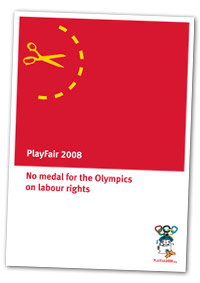WELCOME TO THE ARCHIVE (1994-2014) OF THE MAQUILA SOLIDARITY NETWORK. For current information on our ongoing work on the living wage, women's labour rights, freedom of association, corporate accountability and Bangladesh fire and safety, please visit our new website, launched in October, 2015: www.maquilasolidarity.org
June 8, 2007

A new report released today by the Play Fair 2008 Campaign exposes gross violations of workers’ rights by several Chinese factories supplying goods under license for the Beijing Olympics, including employment of children, adults being paid half the legal minimum wage, and employees forced to work 12-hour shifts, seven days a week, in unsafe and unhealthy conditions.
Detailed research inside China into working conditions in four factories making Olympics bags, headgear, stationery and other products also revealed that factory owners are falsifying employment records, and forcing workers to lie about their wages and working conditions.
Since the Athens 2004 games, the Play Fair Campaign has been lobbying the International Olympics Committee (IOC) to require adherence to minimum labour standards as a condition of receiving Olympic licensing contracts. So far, the IOC has refused to do so.
“Licensing of the Olympics brand is a major source of income for the IOC and national Olympics committees, and it brings shame on the whole Olympics movement that such severe violations of international labour standards are taking place in Olympics-licensed factories,” says Guy Ryder, General Secretary of the International Trade Union Confederation, a PlayFair Campaign partner along with the global textile union ITGLWF and the Clean Clothes Campaign.
In Canada, the Maquila Solidarity Network and the Canadian Labour Congress have been calling on the Vancouver Olympic Organizing Committee (VANOC) to adopt ethical standards for makers of Olympic-branded products.
Although the new Play Fair report does not include information on VANOC-licensed Olympics products, it does point to systemic problems in Chinese factories that should be of concern to the Olympics movement in Canada and internationally, especially since VANOC-licensed goods are also produced in China.
On June 5, VANOC announced it was adopting an ethical licensing policy for Olympics-licensed clothes and other products for the Beijing and 2010 Vancouver Olympic Games.
“We welcome VANOC’s recent efforts to address worker rights issues with their licensees,” says Bob Jeffcott, Policy Analyst with the Toronto-based Maquila Solidarity Network. “But this report demonstrates what can happen if VANOC’s program isn’t stringent or transparent enough to identify and correct worker rights violations. VANOC should pay particular attention to its wages and hours of work requirements, and to reports that auditors are being duped by factory management.”
Amongst the findings of Play Fair researchers, based on worker interviews and investigations in several factories in early 2007 are:

Le Kit Stationery Co Ltd (providing stationery for the 2008 Beijing Olympics): More than 20 children, the youngest being just 12 years old, had been hired during school holidays and were working from around 7:30 am until 10:30 at night doing the same jobs as adults. Forced overtime, harsh fines and punishment of workers, and wages less than half the legal minimum were amongst the violations uncovered in the factory, which does not give its 400 employees any contract or even a letter of employment.

Mainland Headwear Holdings Ltd (claims to have been granted “sole rights by the Beijing Games Organizing Committee” to produce hats with the Olympic insignia): Employs some 3,000 workers at its Shenzhen factory, paying them as little as 45% of the minimum wage and forcing them to work overtime far in excess of the legal limit. Workers who resign are “fined” one month’s wages by the company, while the whole workforce is given instructions on how to lie to outside inspectors about wages and conditions. Any worker who tells the truth faces instant dismissal, while those who follow the factory’s “answer guidelines” are given a financial reward. Mainland also claims to be sole headwear supplier for China and Japan of FIFA-licensed headwear.

Eagle Leather Products: A Hong Kong owned company based in Guangdong with a workforce of around 200 told PlayFair researchers that more than 50% of the company’s production is for the Beijing Games. Most workers producing the company’s Olympics-branded bags are made to work 30 days per month, with forced overtime, meaning that total working hours in a month can be in excess of 300 hours. “We’re so exhausted, trying to get the ‘Olympic bags’ done in time! To hell with the Olympics product, I am so tired,” said one worker. While Eagle workers reported that wage levels are satisfactory, excessive fines and punishments and arbitrary rules, coupled with canteen food that “even a pig wouldn’t eat,” make life extremely difficult for the company’s workforce.

The Yue Wong Cheong company’s operations in Shenzhen, with 3,800 employees, produce some 50 different items under license for the 2008 Olympics. PlayFair’s investigation team found that it regularly pays its workers less than 50% of the minimum wage, and requires them to work 13 hours per day with few, if any, days off during each month. Many workers complained about the poor health and safety conditions, including constant pain due to bad ergonomics, fire hazards, skin problems from chemicals and respiratory problems from the dust and fluff in the workplaces. Fake salary slips are used to dupe outside inspectors sent by the company’s clients to check wages and conditions.